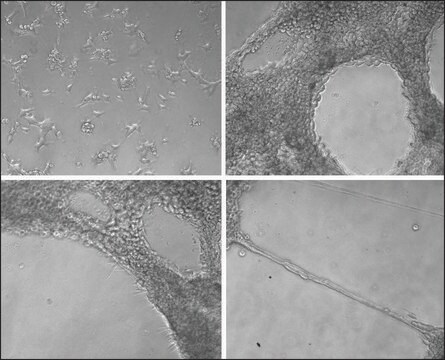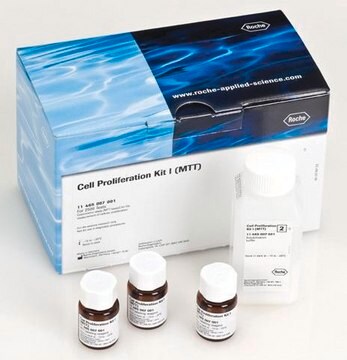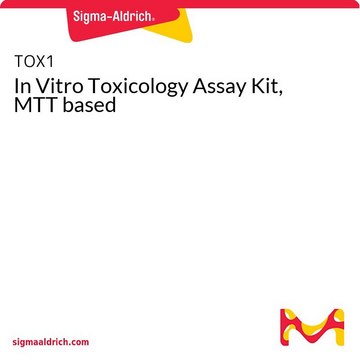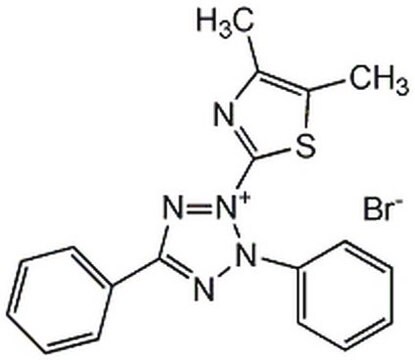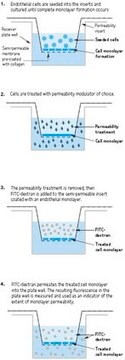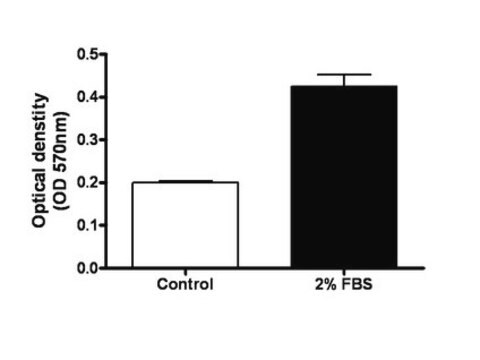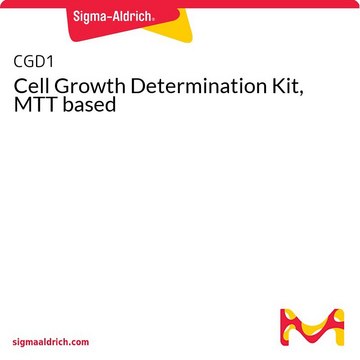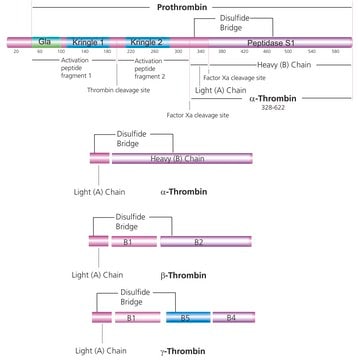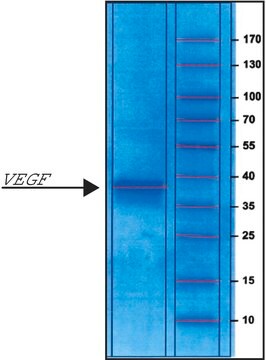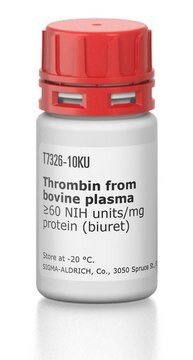ECM630
Fibrin In Vitro Angiogenesis Assay
The Fibrin Gel In Vitro Angiogenesis Assay Kit represents a simple model of angiogenesis in which the induction or inhibition of tube formation by exogenous signals can be easily monitored.
About This Item
Recommended Products
Quality Level
species reactivity
vertebrates
manufacturer/tradename
Chemicon®
technique(s)
activity assay: suitable
cell based assay: suitable
shipped in
dry ice
General description
Angiogenesis is the process of generating new capillary blood vessels. It is a fundamental component of a number of normal (reproduction and wound healing) and pathological processes (diabetic retinopathy, rheumatoid arthritis, tumor growth and metastasis)1.
The CHEMICON Fibrin Gel In Vitro Angiogenesis Assay Kit provides a convenient system for evaluation of tube formation by endothelial cells in 96-well or other formats. When cultured on top or within a fibrin gel, endothelial cells rapidly align and form interconnecting networks that can display patent lumina2,3. Tube formation is a multi-step process involving cell adhesion, migration, differentiation and growth4. The formation of intercellular connections and lumina within endothelial cell networks in fibrin gels is dependent upon the actions of VE-cadherin, avb3 and a5b1 integrins, the cdc42 and Rac1 GTPases, and membrane-type matrix metalloproteinases (MT-MMPs)2,3,5,6. Angiogenesis within fibrin gels in vitro is regarded as an accurate model for wound healing and tumor angiogenesis, as tumor cell-derived vascular endothelial growth factor/vascular permeability factor promotes leakage of fibrinogen from the tumor vasculature and formation of a fibrin-rich proangiogenic provisional matrix7.
Fibrin gel formation is initiated by enzymatic cleavage of fibrinogen, a heterotrimer, by thrombin8. The resulting cleaved fibrin molecules form regular, multimolecular arrays that are highly translucent. The concentrations and formulations of the fibrinogen and thrombin in this kit are optimized for maximal tube-formation by HUVEC and easy visualization of these tubes.
Application
The CHEMICON Fibrin Gel In Vitro Angiogenesis Assay Kit represents a simple model of angiogenesis in which the induction or inhibition of tube formation by exogenous signals can be easily monitored. Fibrin gels are easily and quickly formed in culture dishes by mixing Fibrinogen and Thrombin Solutions. For assaying inhibitors or stimulators of tube formation, simply premix the endothelial cell suspension with different concentrations of the inhibitor or stimulator to be tested, before adding the cells to the top of the fibrin gel. Addition of a second layer of fibrin gel on the day after plating the cells is optional, but will promote optimal survival and a higher degree of network and lumen formation. The assay can be used to monitor the extent of tube assembly in various endothelial cells, e.g. human umbilical vein cells (HUVEC) or bovine capillary endothelial (BCE) cells.
Cell Structure
Components
Thrombin solution: (Part No. 90246) One 7.5 mL bottle.
100x Positive Control Angiogenic Supplement: (Part No. 90247) One 0.5 mL vial. (Contains1.0 mg/ml insulin from bovine pancreas, 0.55 mg/ml human transferrin (substantially iron-free), and 0.5 μg/ml sodium selenite in EBSS without phenol red).
Storage and Stability
Legal Information
Disclaimer
Signal Word
Warning
Hazard Statements
Precautionary Statements
Hazard Classifications
Acute Tox. 4 Oral
Storage Class Code
10 - Combustible liquids
Regulatory Listings
Regulatory Listings are mainly provided for chemical products. Only limited information can be provided here for non-chemical products. No entry means none of the components are listed. It is the user’s obligation to ensure the safe and legal use of the product.
PDSCL
Please refer to KIT Component information
PRTR
Please refer to KIT Component information
FSL
Please refer to KIT Component information
ISHL Indicated Name
Please refer to KIT Component information
ISHL Notified Names
Please refer to KIT Component information
Cartagena Act
Please refer to KIT Component information
JAN Code
キットコンポーネントの情報を参照してください
Certificates of Analysis (COA)
Search for Certificates of Analysis (COA) by entering the products Lot/Batch Number. Lot and Batch Numbers can be found on a product’s label following the words ‘Lot’ or ‘Batch’.
Already Own This Product?
Find documentation for the products that you have recently purchased in the Document Library.
Customers Also Viewed
Articles
Cell based angiogenesis assays to analyze new blood vessel formation for applications of cancer research, tissue regeneration and vascular biology.
Our team of scientists has experience in all areas of research including Life Science, Material Science, Chemical Synthesis, Chromatography, Analytical and many others.
Contact Technical Service
